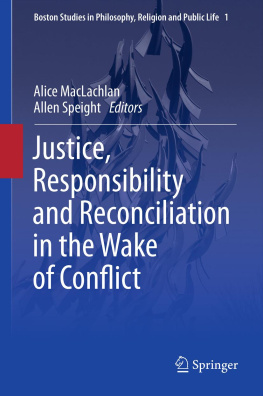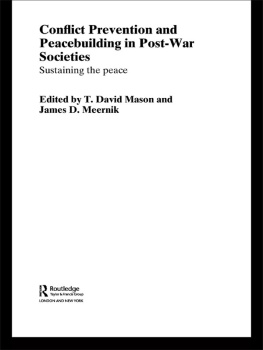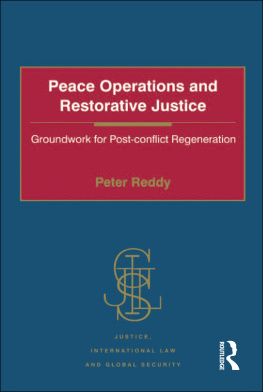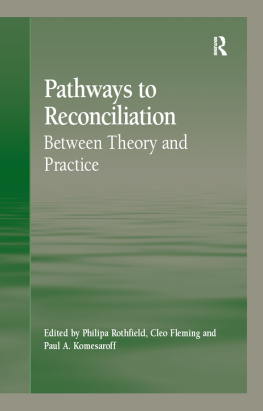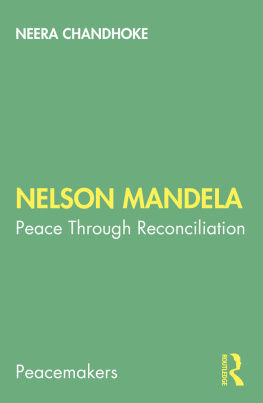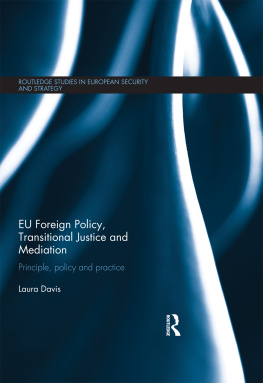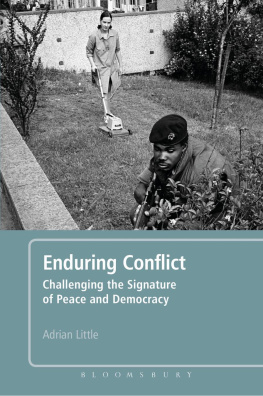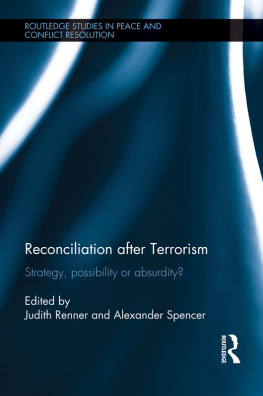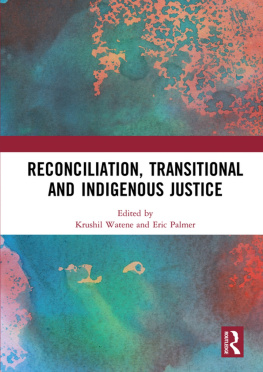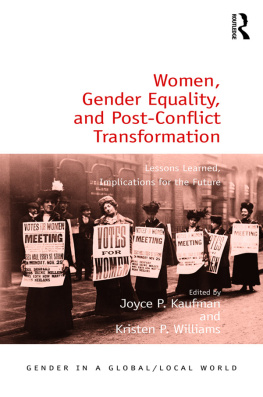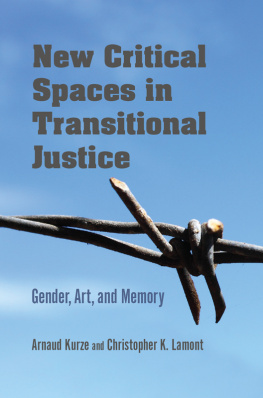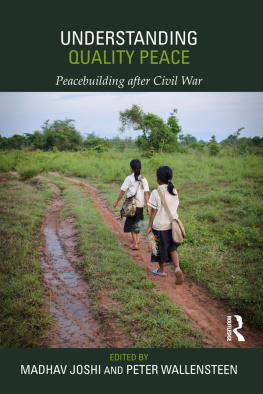Alice MacLachlan and Allen Speight (eds.) Boston Studies in Philosophy, Religion and Public Life Justice, Responsibility and Reconciliation in the Wake of Conflict 2013 10.1007/978-94-007-5201-6_1 Springer Science+Business Media Dordrecht 2013
1. Introduction
1.1 The Wake of Conflict: Charting the Terrain
What are the moral obligations facing participants and bystanders in the wake of conflict? How have theoretical understandings of justice, peace, and responsibility changed in the face of contemporary realities of war?
Recent years have seen a wide discussion among academics and policy makers concerning issues such as the nature of just war, the ethics of killing, and the responsibilities of agents within and beyond the immediate theater of conflict. Yet there remain large and under-explored facets of the modern experience of conflict and its aftermath that require conceptual and practical attention.
Some of these questions may seem to be quite basic but are, given the experience of the last few years, still the most resistant to easy conceptual formulations. What in fact is meant by peace and conflict? What are the relevant conditions for discerning that agents or victims are within one or the other? How can they be distinguished from intermediate stages such as truces or states of emergency and what governs the normative relationships in each? There is still much to be thought through in considering the various relevant roles those of participants, victims, bystanders, third parties, witnesses, etc. in conflict and post-conflict situations.
A further concern animating this volume is the wide range of differing idioms within the contemporary discussion of conflict and post-conflict situations. First, there is the familiar (yet increasingly challenged) just war tradition, in which a distinct theory of jus post bellum remains despite much new work still a desideratum alongside the more worked-out areas of traditional concerns with the justice of the cause of war ( jus ad bellum ) and its just conduct ( jus in bello ). While just war theory has roots dating back at least to Augustine, it has been taken up with renewed interest by philosophers and political thinkers in the last generation in large part as a response to new challenges posed by the nature of conflict and warfare in the post-World War II world. Michael Walzers Just and Unjust Wars (Walzer ) has raised new questions about Walzers formulations of the separation in traditional just war theory between jus ad bellum and jus in bello , as well as more broadly the separation between the morality of killing in war and the morality of killing in other circumstances. The question of wars aftermath , however the territory marked out but much less developed within traditional just war theory in terms of jus post bellum has remained very much an open one, as the papers in the first section of the volume will attest.
Second, there is the growing field of literature on moral repair, both material and symbolic (Spelman ), are suspicious of boosterism about forgiveness in politics, fearing that it undermines legitimate claims of political injustice. In other words, the literature of moral repair not only raises issues regarding the nature and methods of repair; it also challenges whether norms of repair are always appropriate asking whether some relationships are better left broken.
Finally, a third literature has grown around numerous recent attempts to consider the specific structure of certain moral, cultural, and political norms for post-conflict responsibilities and obligations. Many such attempts fall under the relatively new category of transitional justice. In the wake of conflict or regime change, political actors confront questions of individual and collective responsibility and thus, the need for accountability and legal justice without stable, recognizable sources of legal and political authority to draw upon. Furthermore, in many cases, responsibility for wrongdoing is both convoluted and widespread across wide segments of the population, making it hard to know how, and whom, to punish appropriately. Familiar institutions like criminal trials and punishment give way to (or are supplemented by) other mechanisms, such as truth commissions, public inquiries, formal apologies and negotiated amnesties and pardons. The seemingly distinctive nature of the claims that arise in transitions from conflict to peace, or from authoritarianism to democracy as rapidly changing political and legal structures seek to deal with the legacies of past wrongdoing have led some, most notably, Ruti Teitel, to argue that transitional justice represents a unique and distinct kind of justice (Teitel ).
The concern fueling both advocates and skeptics of transitional justice appears to be the understandable unease felt by proponents of liberal justice, when norms and values unfamiliar to so-called ordinary legal justice (at least, conservatively conceived) are invoked for example, talk of reconciliation and forgiveness, truth telling and amnesty. Indeed, these values have led some to argue that transitional justice is not justice at all, but euphemistically describes an uneasy compromise, in which the demands of justice are not given their usual priority, but are weighed against other social priorities priorities that are just in name only (Ash ). The drive to define transitional justice as a unique and distinctive kind is motivated in part by the need to defend it (and the measures associated with it) as something other than a corruption or dilution of justice proper, while still asserting its status as something appropriately like justice, as we typically understand it.
In each of these three distinct yet interconnected literatures that is, just war, moral repair, and transitional justice familiar moral and political issues come to the fore, albeit couched in very different terms. These include tensions between individual freedoms and collective cooperation, the allocation of moral and political responsibilities, the importance of recognition and respect in political life, the resolution of political disagreements, and the limits of civil discourse. Ultimately, theorists and practitioners in all three are concerned to determine how we ought to see and remember what has taken place within a given conflict, the agents involved, relevant norms of reconstruction, the short and long term meanings given to the conflicts and their aftermath, and most significantly how to prevent their repetition. It is our belief that bringing key theorists together, across contexts, debates, and disciplines, furthers each of these ultimate investigations. Furthermore, the answers garnered in one debate hold important implications for each of the others. For instance, just what combatants on each side of a conflict are willing to accept as justice, following the cessation of hostilities, will depend in part on the trust and recognition garnered by symbolic acts of apology and healing, or by the reinstatement of democratic and other community norms.
This volumes aim is to bring together new papers from leading scholars in these differing idioms within the fields of philosophy, political theory, international law, religious studies, and peace studies with an eye to pursuing essential questions about conflict and its aftermath in an interdisciplinary way. The origin of the collection lies in a year-long lecture series and conference hosted by the Institute for Philosophy and Religion at Boston University in 20082009 around the theme Justice in Conflict Justice in Peace. The focal conference of the series, on Reconciliation, Moral Obligation and Moral Reconstruction in the Wake of Conflict, was held in March 2009 and provided an initial interdisciplinary forum for many of the participants in this volume to share ideas and seek common approaches.

